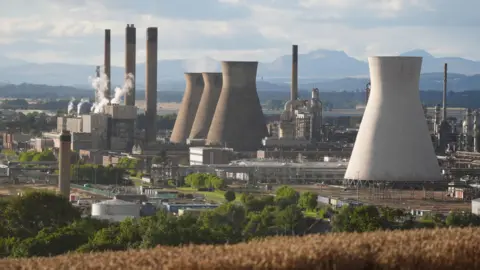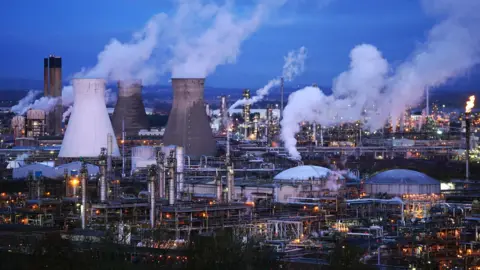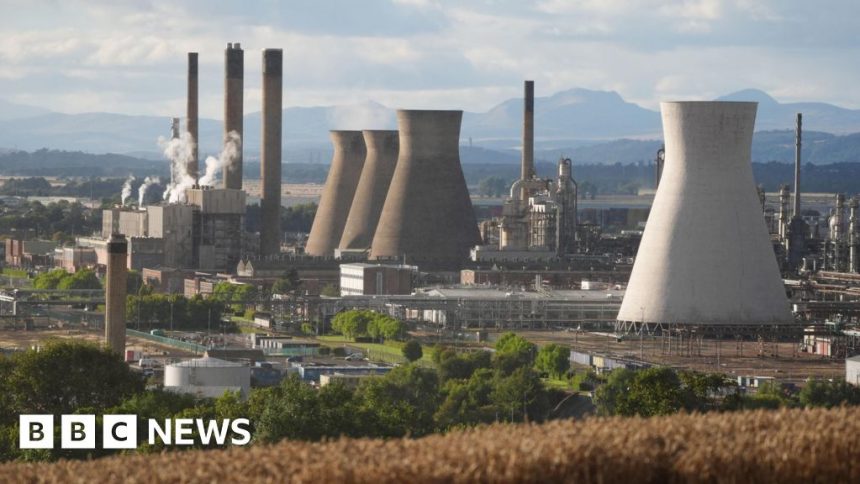Governments hopeful of new jobs for Grangemouth workers
 PA Media
PA MediaThe Scottish and UK governments have said they are hopeful workers facing redundancy in Grangemouth will quickly be offered new jobs.
About 400 jobs are expected to go when the refinery closes next year.
Unions have accused ministers of failing to plan properly for a “just transition”, and said thousands more workers had been left at risk.
But Scottish energy secretary Gillian Martin told BBC Scotland’s Sunday Show she was “confident” highly skilled staff would find other work.
And UK energy minister Michael Shanks said he was aware of other companies having already reached out to the workforce about taking them on.
When the decision about the refinery’s closure was announced on Thursday the UK and Scottish governments announced a joint £100m investment package in the hopes of improving prospects in the Grangemouth area.
But Ms Martin was unable to say how many jobs the investment would likely save.
“That is going to be a matter for commercial companies coming into the area,” she said.
“I would imagine that at the moment, there’s quite a lot of companies looking at the skills layout of that workforce and making offers to those people that they need.
“They are a highly skilled, highly experienced workforce who have the skills that could be transitioned into making biofuels, into making hydrogen and, of course, running the import terminal.
“I am confident that those highly skilled people will find other work.”
Michael Shanks told The Sunday Show the government was working to support a fair transition away from fossil fuels.
He said there was also targeted support for the community and workforce.
Shanks added: “I already know there’s a few employers who have reached out to the workforce.”
He said closing the refinery was a disappointing decision and added: “What we now need to make sure is that those workers have got a future but also that the site itself has got a strong industrial future.”
Potential buyer
During First Minister’s Questions last week, the local MSP revealed she was working with a potential buyer.
The SNP’s Michelle Thomson told the Holyrood chamber: “I have been working with a third party that hopes to purchase the refinery in its entirety.
“The matter is, of course, commercially sensitive and confidential, but will the first minister meet me so that I can share what information I can, with the permission of the potential buyer?”
First Minister John Swinney replied that he was happy to meet Thomson.
On The Sunday Show, Gillian Martin said she was “wary” of talk of a potential buyer, but added that the Scottish government had “no idea” who the potential buyer was.
“I think one of the things that I’m slightly wary of is the fact that Petroineos actually said around late November last year that their intention was to close the refinery in its current form and turn it into an import terminal,” she said.
“I would have imagined that if anyone was interested in taking over the refinery, that would have been the key point to get in touch, but obviously, I don’t know the background of these people.”
Ms Martin added: “I would like to know who they are, I would like to know what their background is.
“And I think Petroineos obviously would like to have an understanding of who this person is as well.”
Thomson, who was elected for the SNP for Falkirk East in 2021, “did not know much about” the potential buyer when she spoke to Martin about the situation.
The Scottish energy secretary said: “Since then, she says things have been fast moving, she’s got more information.
“She’s obviously said what she said at First Minister’s Questions last week about introducing them to the government, but I think also Petroineos needs to be involved, because of course, they’re the people that would be selling the plant, if someone’s interested.”
 PA Media
PA MediaUnions have said the facility should remain open for longer, in order to provide time for a green alternative to be established.
They have also criticised politicians for failing to plan properly for the site’s closure and transitioning away from fossil fuels more generally.
The refinery was opened by BP in 1924 and expanded into petrochemicals in the 1950s.
It is the main supplier of aviation fuel for Scotland’s airports and a major supplier of petrol and diesel ground fuels across the Central Belt.
Ineos acquired the site in 2005 and are responsible for the entire plant, while the refinery itself is owned by Petroineos – a joint venture between Ineos and PetroChina.







